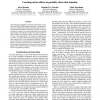Free Online Productivity Tools
i2Speak
i2Symbol
i2OCR
iTex2Img
iWeb2Print
iWeb2Shot
i2Type
iPdf2Split
iPdf2Merge
i2Bopomofo
i2Arabic
i2Style
i2Image
i2PDF
iLatex2Rtf
Sci2ools
125
click to vote
ECAI
2010
Springer
2010
Springer
Learning action effects in partially observable domains
We investigate the problem of learning action effects in partially observable STRIPS planning domains. Our approach is based on a voted kernel perceptron learning model, where action and state information is encoded in a compact vector representation as input to the learning mechanism, and resulting state changes are produced as output. Our approach relies on deictic features that embody a notion of attention and reduce the size of the representation. We evaluate our approach on a number of partially observable planning domains, adapted from domains used in the International Planning Competition, and show that it can quickly learn the dynamics of such domains, with low average error rates. Furthermore, we show that our approach handles noisy domains, and scales independently of the number of objects in a domain, making it suitable for large planning scenarios.
Artificial Intelligence | ECAI 2010 | Observable Planning Domains | Planning Domains | STRIPS Planning Domains |
Related Content
| Added | 08 Nov 2010 |
| Updated | 08 Nov 2010 |
| Type | Conference |
| Year | 2010 |
| Where | ECAI |
| Authors | Kira Mourão, Ronald P. A. Petrick, Mark Steedman |
Comments (0)

